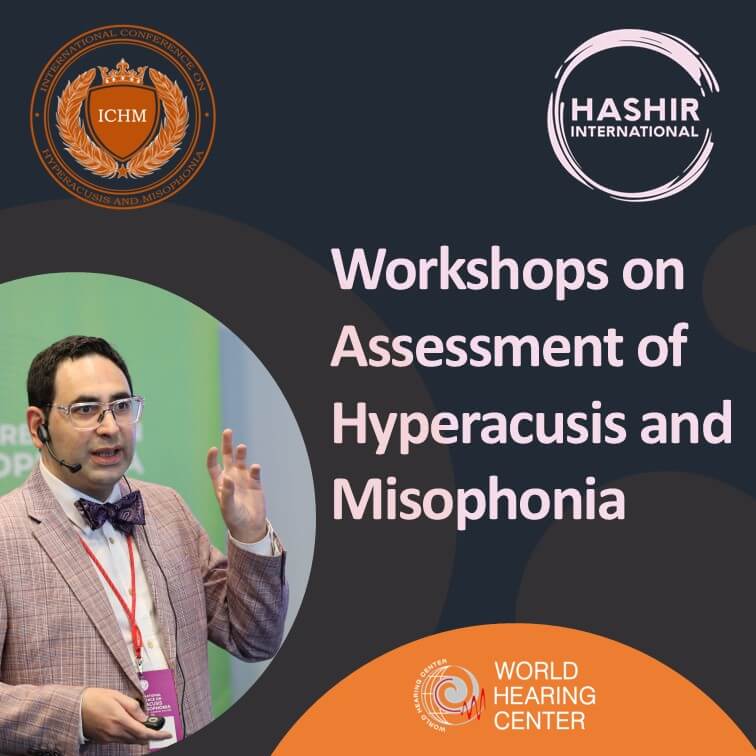
Workshops on 4C hyperacusis and misophonia assessment method and differential diagnosis between misophonia and mental health disorders were delivered by Dr Hashir Aazh (UK) and Dr Jaelline Jaffe (USA) for an audience of expert clinicians and researchers in the fields of audiology, ENT, mental health, neuroscience, epidemiology, psychoacoustic, psychometry, and neurology on 15th September 2024 at World Hearing Centre (Kajetany, Poland).
Dr Aazh explained that one of the reasons in favour of the status quo and against taking part in a therapy for hyperacusis and misophonia is the patient’s lack of confidence in their ability to make the change (i.e., they are not confident that they can abandon avoidance behaviours and rituals and learn a different way of managing their problem). For example, a patient with misophonia may think that “I do not think that I can control my anger even with CBT. It is easier to avoid people at mealtimes” or a person with hyperacusis may think “I can avoid pain in my ears by avoiding loud sounds, but I doubt that I can use CBT to avoid pain.” In this workshop he outlined (1) factors related to improving patient’s readiness and motivation for therapy, and (2) how to utilise 4C Hyperacusis and Misophonia Management Questionnaires. He described that using 4C questionnaires helps the clinician to encourage the patient to explore their own strengths, motivations and resources that can help them to learn and apply the CBT skills in order to manage their hyperacusis or misophonia without relying on avoidance and ritualist behaviours.
Dr Jaelline Jaffe, has been a licensed psychotherapist in Southern California since 1976, working with individuals, couples, and medical issues, which led to her establishing LemonAidCounseling.com. For the past dozen years, her practice has focused almost exclusively on sound sensitivity disorders, mainly Tinnitus and Misophonia. She has worked with many hundreds of Misophonia patients from age 8 to 70, mostly with teens and young adults, who often find her via her website, SensitiveToSound.com. Dr. Jaffe often works in conjunction with audiologists across the US to assist their patients with the intense emotional and family issues associated with Tinnitus, Misophonia, and Hyperacusis. She has presented on these topics at numerous professional conferences for audiologists as well as for psychotherapists. Dr. Jaffe is a cofounder and Board member of the Misophonia Association, and also program coordinator for their annual convention for hundreds of patients and families. The 11th annual convention will take place in November 2024 in Atlanta, GA. Dr. Jaffe is author of the upcoming book “These Sounds are Driving Me Crazy!” Training for Mental Health Professionals in Treating Sound Sensitivity Disorders.
Dr Jaffe’s workshop aimed to assist clinicians in distinguishing misophonia from other mental health issues that would most appropriately be referred to mental health services. Audiologists are increasingly learning to use CBT (cognitive behavioural therapy) to assist their patients with misophonia management, following a structured plan developed for their implementation. While this approach might be helpful for patients, it is incumbent upon providers to recognize limitations when deeper issues may be present. Misophonia typically presents with several features that could also, or instead, indicate a more complex mental health condition. For example, misophonia patients commonly exhibit high degrees of perfectionism, rigidity, and excessive preoccupation with rules, including harsh judgment of others who – in their view – are disrespectful of their rules. But these can also be symptoms of OCD (obsessive compulsive disorder) or OCPD (obsessive-compulsive personality disorder), which need to be addressed by a qualified mental health professional. There are other frequent concurrent symptoms indicative of underlying co-occurring psychological problems involving depression, anxiety, self-injury, or possible history of trauma. Several case studies will illustrate these distinctions and highlight the significant role of psychotherapists in collaboration with audiologists or ENTs in treatment of misophonia and tinnitus.
